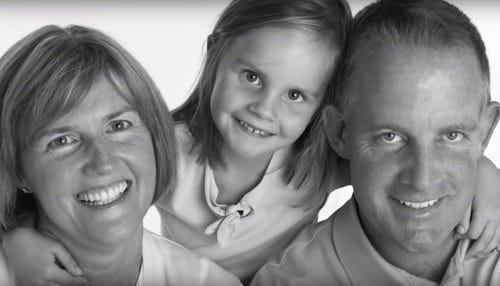The Reality at Riley: Rare Cancers Need Cash
 Wilms’ Tumor ended Caroline's life when she was five years old. Riley leaders say “there really isn’t a lot of effort” to research rare pediatric cancers.
Wilms’ Tumor ended Caroline's life when she was five years old. Riley leaders say “there really isn’t a lot of effort” to research rare pediatric cancers.
Subscriber Benefit
As a subscriber you can listen to articles at work, in the car, or while you work out. Subscribe NowElizabeth and David Symmes grapple with the fact that life isn’t what they pictured. In 2009, the Indianapolis family lost their oldest child, Caroline, to a rare form of pediatric cancer when she was just five years old. Her doctors struggled to find any treatment that would give her a chance of survival; the cancer is one of a handful that research has neglected, because the funding simply doesn’t exist. The mom-and-dad team has led a charge to raise millions—and now needs the Indiana business community to close the deal.
“The sad reality is these diseases are really never researched,” says Dr. Jamie Renbarger, section chief of hematology/oncology at Riley Hospital for Children at Indiana University Health.
Sadder still is that it’s a money problem. The federal budget for cancer research is $5.21 billion, but only about 4 percent of that funding is dedicated to pediatric cancer. That lack of research means doctors struggle to treat the diseases. Renbarger says, for Wilms’ Tumor and a few others in particular, “there really isn’t a lot of effort.”
However, Renbarger says the Symmes family is making waves at Riley with the Caroline Symmes Cancer Endowment
“We’ve come a long way in curing childhood cancers; we cure about 75 percent of kids with cancer,” says Renbarger. “The challenge is the 25 to 30 percent of kids who we don’t currently cure. Outcomes really haven’t improved a lot over the last 15 to 20 years, particularly in the solid tumor arena.”
That’s why the new program the Symmes are seeking to build will focus on Non-CNS Solid Tumors, which occur outside the central nervous system (CNS) and are typically the most aggressive. These are cancers with unfamiliar names: Caroline battled Wilms’ Tumor, and others include neuroblastoma, osteosarcoma and Ewing sarcoma. While the number of kids battling Non-CNS solid tumors is relatively small, they face the worst prognosis; the cancers often don’t respond to chemotherapy and recurrence is common.
“When Caroline was alive, they were throwing adult drugs at her,” says Elizabeth. “And her oncologist was looking at us saying, ‘I’ve got nothing. This tumor will not respond to anything, and we’re throwing everything at her.’”
Creating a Non-CNS solid tumor program at Riley would allow it to grow the number of investigators with a primary focus on neglected pediatric cancers. Renbarger says it would be the only program of its kind in the world; researchers will have the dual focus of developing new drugs and moving them rapidly to the clinic to help children. Riley says it is also one of only a few research hospitals embracing genome therapy, which can pinpoint drugs that will be most effective for each individual child.
“It makes us extraordinarily unique by not only looking at the tumor,” says Renbarger, “but also putting that information with the genetic and clinical characteristics of that child: their own cells, and how to pick the right medication at the right dose at the right time that is most effective and safest for an individual patient.”
The $2 million already raised will support an endowed chair of the program and help it earn additional funding from government agencies, such as the National Institutes of Health. Riley says every $1 donated to the endowment opens the door to $7 in federal funding. With September being Childhood Cancer Awareness Month, the family hosted events that raised approximately $250,000 for the endowment, “but that’s nothing when you have to raise $8 million,” says Elizabeth.
“Quite frankly, David and I are not capable of raising $8 million, and we personally can’t write a check anywhere near that amount,” says Symmes. “We need the business community; we have to have sponsorships or partnerships. If somebody came to us and said, ‘we’re going to give you that big check, but we want naming rights,’ we’d take that check, give it to Riley and put their name on it.”
There will be no physical center, “so we’re not funding brick and mortar, which is a beautiful thing,” says Symmes. Instead, the money will go directly to the research mission.
“The tragedy that happened to Caroline shouldn’t have happened; there’s plenty of money out there to fund the research of new drugs,” says Elizabeth. “We want to do everything possible to make better outcomes for other children. We have to be a voice, we have no other choice. This is what helps us keep going.”
There were no drugs to treat Caroline, but Elizabeth says Dr. Renbarger is the perfect investigator to find new drugs for other children that don’t have harmful long-term side effects.
Elizabeth says the endowment started with $25,000 from a friend and quickly ballooned to half-of-a-million dollars.
Renbarger believes a breakthrough for treating rare childhood cancers is within reach.
